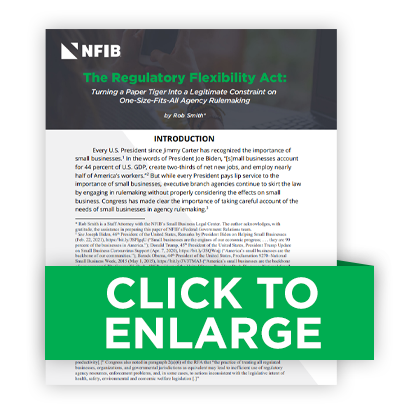May 2, 2023
The Danger of One-Size-Fits-All Regulations for Small Business

The Regulatory Flexibility Act (RFA), unanimously passed by Congress in 1980, was enacted to protect small businesses from one-size-fits-all rulemaking by federal agencies. Even though every U.S. President since that time has recognized the importance of small businesses, federal agencies often fail to comply by engaging in rulemaking without considering the effects on small business. A new white paper by the NFIB Small Business Legal Center explores the lack of RFA compliance and what today’s Congress can do to reinvigorate the RFA.
“When the Regulatory Flexibility Act was passed, it was a bipartisan effort to address the disproportionate impact of federal government regulations on small businesses,” said Beth Milito, Executive Director of NFIB’s Small Business Legal Center. “It has been over 25 years since the last major update to the RFA. In that time, the administrative state has grown exponentially, as has the regulatory burden on small businesses. Now more than ever, small businesses feel the costly and time-consuming burden of federal regulations that fail to consider their resources and needs. Small businesses would once again benefit from congressional action to protect them from one-size-fits-all rulemaking, as the 96th Congress did in enacting the RFA.” The RFA was enacted over 40 years ago to remedy what Congress viewed as a growing problem and danger to the national interest: the increasing number of one-size-fits-all regulations. The RFA imposes numerous obligations on federal agencies, most importantly that they must conduct two separate analyses before enacting a new rule:- First, agencies must conduct a front-end Initial Regulatory Flexibility Analysis (IRFA), which examines whether a proposed rule will have a significant economic impact on small businesses.
- Second, agencies must conduct a back-end Final Regulatory Flexibility Analysis (FRFA) which assesses the potential impact of the proposed rule on small businesses. The federal agency must then review alternatives that would minimize the rule’s economic impact, as well as explain why the agency believes the rule is necessary.
- Consider the indirect economic impact of regulations, instead of just the direct impact.
- Publish any regulatory less burdensome alternatives to the proposed or final rule, including the economic impact of each alternative and allowing small businesses to provide comments on each alternative.
- Seek SBA Office of Advocacy approval for RFA Compliance before publication of any final rule, ensuring that they have properly conducted the IRFA and FRFA analyses.
NFIB is a member-driven organization advocating on behalf of small and independent businesses nationwide.
Related Articles














